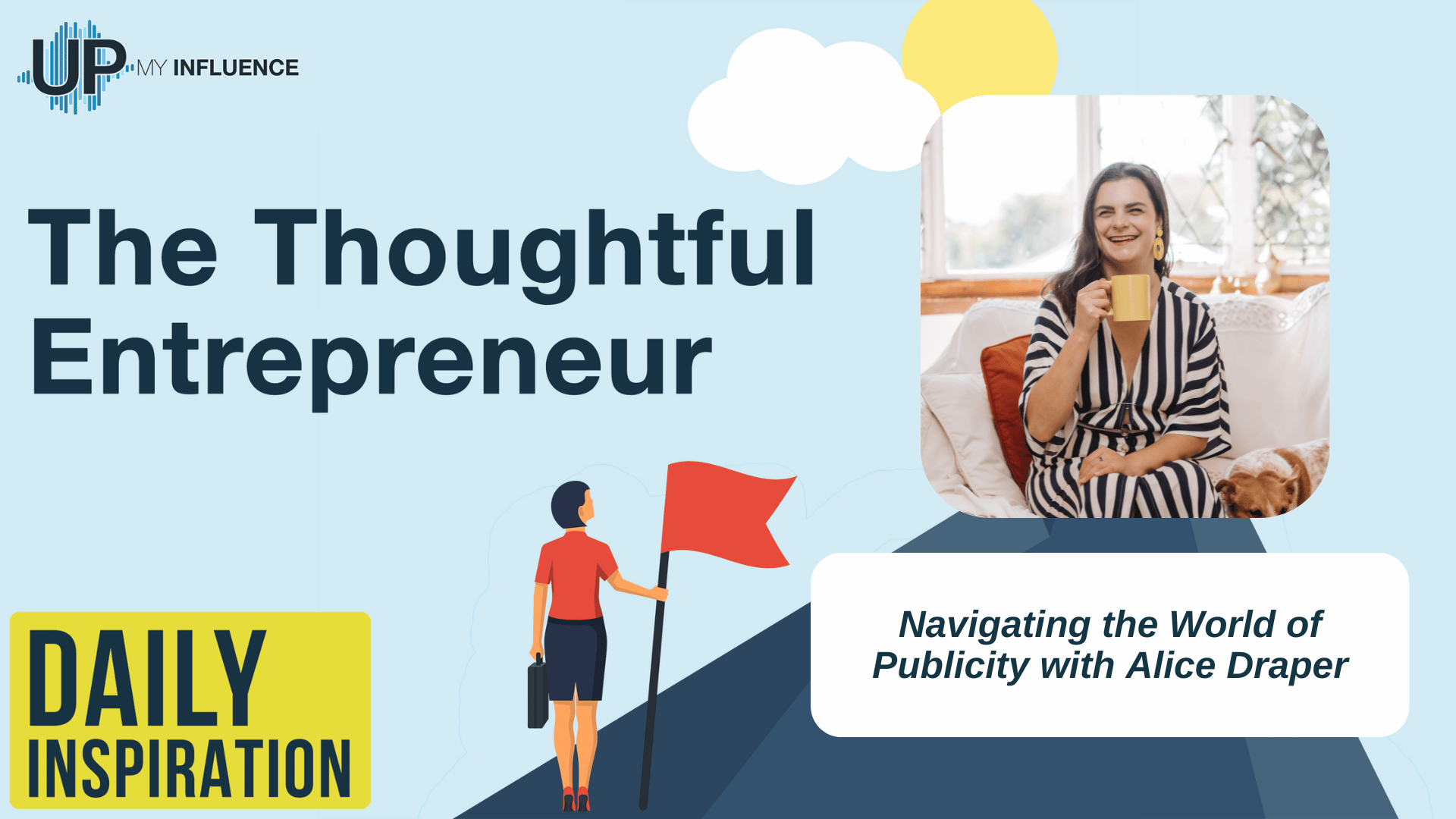THE THOUGHTFUL ENTREPRENEUR PODCAST
In this episode of the Thoughtful Entrepreneur, your host Josh Elledge speaks with the Founder and Chief Strategist of Hustling Writers, Alice Draper.

Alice Draper, the founder and chief strategist of Hustling Writers, focuses on making publicity more accessible for under-recognized entrepreneurs. Her background as a self-pitching journalist who transitioned into a publicity strategist provides deep insights into media pitching.
Alice's professional journey began in journalism, where she developed her skills in writing compelling pitches that secured her features in prominent magazines such as Post and Business Insider. Her experiences underscore the importance of visibility and communication in the entrepreneurial landscape.
Alice discussed the concept of rejection. She views rejections as crucial learning opportunities. She has shifted her focus from crafting perfect pitches to increasing the quantity and quality of her submissions. This approach has helped her build resilience and refine her pitching techniques.
Alice also emphasizes the importance of feedback, viewing it as essential for improvement. By understanding the perspectives of journalists and producers, entrepreneurs can significantly enhance their chances of pitch acceptance. She advocates for personalizing pitches to establish a connection with recipients, which she believes is more effective than sending generic, self-centered pitches.
Key Points from the Episode:
- Making publicity accessible for under-recognized entrepreneurs
- Background in pitching as a journalist
- Experience with rejection and shifting pitching approach
- Importance of building resilience and learning from rejections
- Asking for feedback and understanding journalists' perspective
- Personalizing pitches and creating warm connections
- Company's day-to-day work and Pitcher Power course
- Importance of building warm relationships with journalists and influencers
- Working with clients to share transformation stories
- Emphasizing resilience, empathy, and personalized communication in gaining visibility
About Alice Draper:
Alice Draper has dedicated her career to enhancing visibility for women entrepreneurs who often lack recognition. She established her own business with the aim of mastering publicity to elevate her profile as a premium copywriter. As she adeptly pitched to prominent magazines such as VICE, Refinery29, HuffPost, and Business Insider, Alice discovered and honed her pitching skills, which later led her to shift her focus towards providing publicity services.
Now, with over two years at the helm of Hustling Writers, she has successfully placed her clients in over 500 podcast features, including many within the top 1% and top 0.5% of podcasts.Alice also focuses on the emotional challenges associated with public relations work, particularly handling rejection. Through her weekly newsletter, The Rejection Chronicles, she addresses topics such as coping with rejection sensitivity, fostering resilient outreach practices, and normalizing the emotional impact of rejection. This aspect of her work supports her clients' publicity efforts and strengthens their overall resilience and adaptability in their entrepreneurial journeys.
About Hustling Writers:
Hustling Writers is a public relations firm dedicated to amplifying the voices of underrepresented entrepreneurs by securing them authoritative media placements. Established by Alice Draper in 2020, the firm operates on the principle that effective publicity stems from empathetic storytelling. Hustling Writers aims to shift the business landscape towards more significant equity, focusing on increasing visibility for women and international entrepreneurs facing systemic barriers. Their mission is articulated through powerful narratives that challenge existing disparities in venture capital funding and financial services, particularly highlighting entrepreneurs from marginalized backgrounds.
The firm boasts a talented team, including Tšhegofatšo Ndabane, who, while working towards a Master's in clinical psychology, serves as the Chief Storyteller. Their combined expertise has led to notable successes in placing impactful stories in top publications like Refinery29, VICE, and Business Insider. This approach has not only elevated the profiles of their clients but has also supported them in achieving tangible business outcomes such as enhanced credibility, increased rates, and broader platform growth. Through their work, Hustling Writers play a crucial role in transforming the lives of their clients and their audiences, promoting lasting change in the global entrepreneurial ecosystem.
Tweetable Moments:
01:17 – “We're on a mission to make publicity accessible for under-recognized entrepreneurs.”
04:24 – “Building a rejection resilience muscle translates to all areas of our life, making us more resilient and able to take on bigger tasks.”
Links Mentioned in this Episode:
Want to learn more? Check out Hustling Writers website at
Check out Hustling Writers at LinkedIn at
https://www.linkedin.com/company/hustling-writers/
Check out Alice Draper on LinkedIn at
https://www.linkedin.com/in/alice-m-draper/
Check out Alice Draper on Twitter at
https://twitter.com/alicemdraper
Check out Alice Draper on Instagram at
https://www.instagram.com/alicedraper/
More from UpMyInfluence:
We are actively booking guests for our The Thoughtful Entrepreneur. Schedule HERE.
Are you a 6-figure consultant? I’ve got high-level intros for you. Learn more here.
What is your #1 Lead Generation BLOCKER? Take my free quiz here.
Want to learn more about all the podcasts managed by UpMyInfluence? Opt in here.

